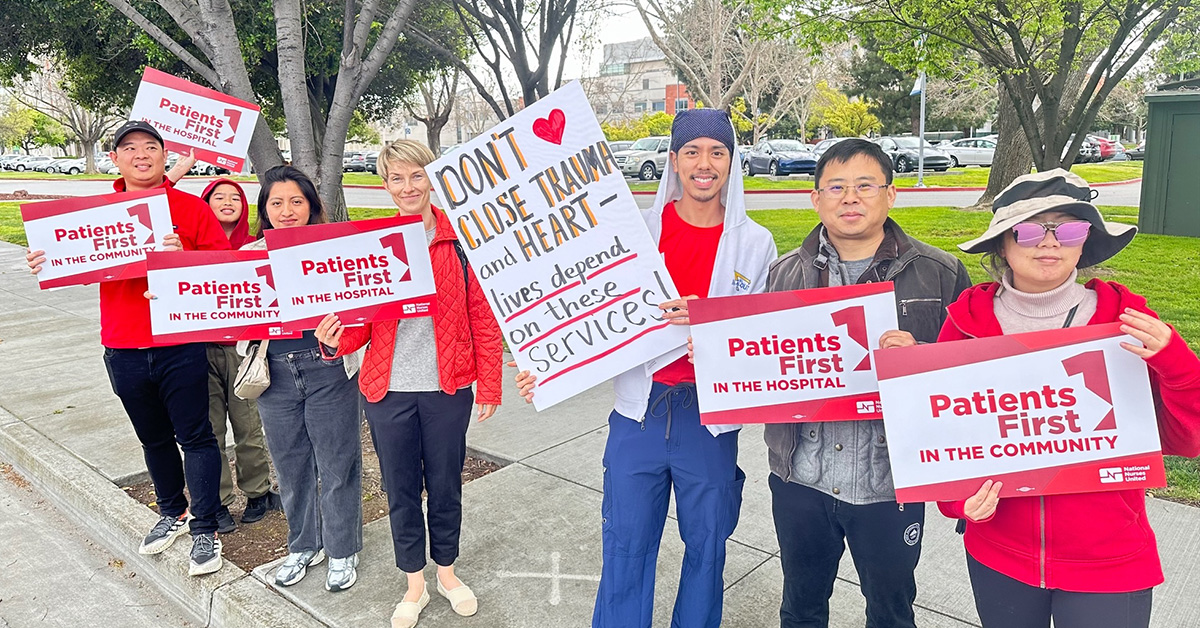Press Release
Nurses and community members to hold a ‘Lives Lost’ rally to illustrate the deadly consequences of HCA’s proposed closure of Regional Medical Center’s trauma center

As members of a coalition of community members representing patients and healthcare workers committed to safeguarding equitable access to medical services for all San Jose residents, registered nurses with California Nurses Association (CNA) will take part in 'Lives Lost' rally on Thursday, June 13. The rally is intended to illustrate the deadly consequences of HCA’s proposed closure of the Regional Medical Center’s trauma center, the elimination of its ST-elevation Myocardial Infarction (STEMI) program, and reduction in stroke center services. HCA has said the closures and cuts to these critical life-saving services are scheduled to take effect August 12, 2024.
“We know if HCA’s Regional Medical Center trauma center closes, we will see more people die needlessly because we are not here to care for them when they desperately need specialized emergency care,” said Linda Vences, a registered nurse at Regional Medical Center. “As nurses, we dedicate our lives to advocating and caring for our patients. While HCA looks at a ledger to decide if a trauma center is good for their shareholders, we look at this trauma center and know it is saving lives everyday. Where will our patients go? How many lives will be lost because of HCA’s greed?”
Who: Registered nurses, coalition members, and elected officials including: Santa Clara County Supervisor Cindy Chavez and San Jose City Councilmember Peter Ortiz
What: ‘Lives Lost’ rally to illustrate the lives that will be lost without Regional Medical Center’s trauma center and other critical services
When: Thursday, June 13, 11:30 a.m.
Where: Intersection of McKee Road and Jose Figueres Avenue, San Jose
Regional Medical Center is part of the Good Samaritan Health Care System owned by HCA, the largest health care system in the country. HCA reported earning over $5.2 billion in profits in 2023. According to HCA’s own financial reports, the Regional Medical Center and Good Samaritan hospital together brought in nearly half a billion dollars from 2018 through 2023.
“It is important the public understand that HCA is using its market power to deny access to certain members of our community without any regard to their well-being,” Melissa Gong, a registered nurse at Regional Medical Center. “HCA is proposing to close these critical services that serve our most vulnerable, all while raking in millions of dollars in profits from it’s sister hospital, Good Samaritan. Our community is a gold mine for HCA and it is indefensible that this multi-billion dollar giant should leave our most vulnerable patients without access to the life saving care they need and deserve.”
The proposed closures would disproportionately affect the most vulnerable in San Jose. According to Santa Clara County Emergency Medical Services Regional Medical Center Specialty Care Services Reduction Impact Assessment, 22 percent of the neighborhoods within the RMC service area have at least a quarter of the families living below 200 percent of the poverty line. Furthermore, the County found 83 percent of RMCs patients used Medi-Cal, Medicare or were uninsured, compared to Good Samaritan where 57 percent of its patients used Medi-Cal, Medicare, or were uninsured.
RMC also has the only comprehensive stroke center in the eastside of Santa Clara County and is the primary destination for one in four stroke patients. RMC serves 65 percent of stroke patients in the county with no insurance.
Trauma center closures are correlated with increase in mortality for injured patients.
A 2014 study found a strong link between closures of trauma centers and an increase in those who experienced a longer drive time to get care. The study authors said the “odds of an in patient mortality increased by 21 percent.”
Regional is one of two trauma centers in San Jose and receives patients from southern Santa Clara County, as well as San Benito and Santa Cruz Counties. Santa Clara Valley Medical Center (SCVMC) is about an eight mile drive from Regional. Santa Clara County anticipates the closure would increase travel time by 20 to 25 minutes.
SCVMC is not equipped to handle a 65 percent surge in trauma patients.
In 2019, Regional treated more than 2,400 trauma patients and SCVMC treated more than 3,700. If SCVMC had to absorb those patients, that would mean a 65 percent increase in trauma patients.
The closures will disproportionately hurt Latine populations in the region.
Data shows that more than 61 percent of patients treated in Regional’s emergency room identify as Latine. Santa Clara County public health officials have already determined that the Latine community is facing significant health inequities in the county, both in access to insurance and primary care, and they note the Latine community “continue[s] to face higher rates of obesity, diabetes, and COVID deaths than others.”
California Nurses Association/National Nurses United is the largest and fastest-growing union and professional association of registered nurses in the nation with 100,000 members in more than 200 facilities throughout California and nearly 225,000 RNs nationwide.